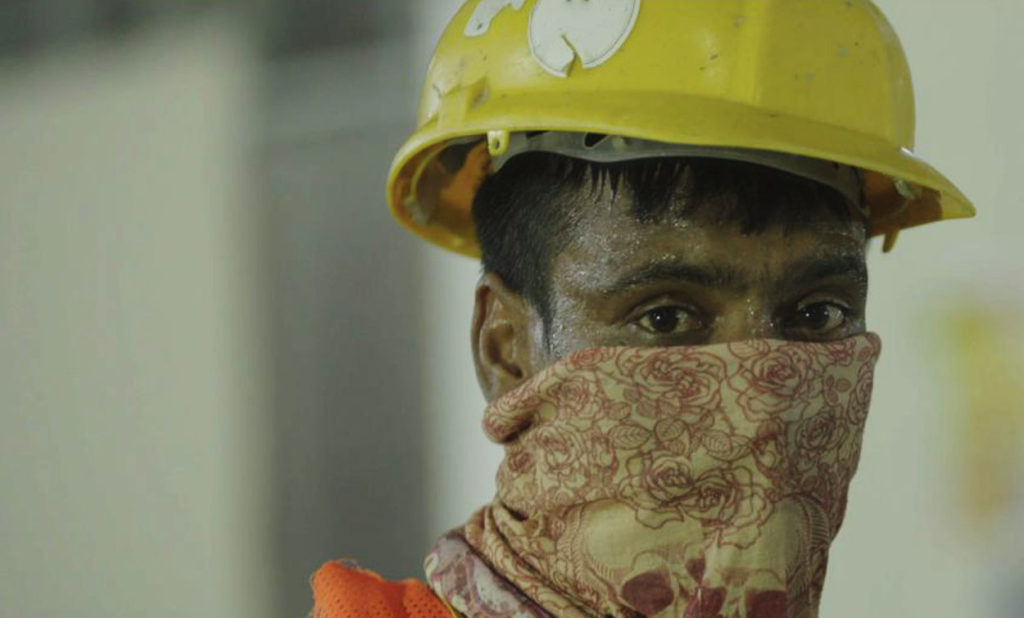
Statement of the Tragedy of Worker Deaths in Preparation for the 2022 World Cup in Qatar
The ongoing preventable deaths, illnesses and injuries of migrant construction workers ahead of the 2022 World Cup in Qatar is a tragedy impossible to reconcile with the lack of effective action taken to address it. Added to the estimated 6,500 dead1 and thousands more injured, many due to heat stress,2 there are growing reports of previously healthy migrant workers returning to their home countries with chronic kidney disease (CKD). Preliminary analysis suggests working conditions with inadequate access to water and rest are risk factors.3 The immediate social and economic impact on the households and health systems in home countries that shoulder the burden of this loss and injury has yet to be calculated but is likely to be staggering. With primary earners dying, being disabled or falling ill with diseases such as CKD, a notoriously expensive and difficult disease to treat for public systems or private citizens, the promised benefits of work abroad potentially brings more loss than gain. Many organizations and institutions shoulder the responsibility for this needless suffering. However, it is important that we as academic researchers and practitioners of occupational health recognize most of us fell short of our responsibilities and ideals by sitting on the sidelines as these issues ground on for a decade.
We owe much to our colleagues who did dedicate their skills and passion for worker safety to this issue in a timely manner. Also necessary is recognizing the work of the media, notably The Guardian’s committed reporters and editors, and the NGOs (e.g., Amnesty International, FairSquare, International Trades Union Confederation) who kept the issue in the spotlight. These organizations frequently employed the skills of researchers to bring attention to the issue when research funding bodies fell short of providing adequate resources to generate the data required to drive protections and changes in policy in Qatar and other Gulf States.
What led to the devastating state of affairs and findings in reports from organizations such as Amnesty International?4 The answer is three-fold. One part lies in the unstated belief that workers are expendable and migrant workers are easily replaced. When organizing officials indicated heat is “not an issue”, it was highly unlikely that they were unaware of the hot weather in Qatar. Rather it was because they believed that heat could be managed for the footballers and that the World Cup competition would be produced in a manner safe for both athletes and spectators. While the outdoor stadiums designed and built for the competitions will all be air-conditioned 5,6 no one in charge appears to have considered the human cost of constructing these air-conditioned sites in such a hot environment – over a 10-year period – all for a four-week event that doubtlessly will generate sufficient profit to have protected the lives that enabled it.

Secondly, it was quite late in the period leading up to the World Cup that Qatar developed some regulations to protect workers. Even these, however, were created with the persistent and naïve belief that by establishing rules and regulations a safe and appropriate work environment was provided. Predictably, the occupational health community has witnessed the consequences of assuming rules are equivalent to preventive action, especially in the absence of effective implementation and enforcement. As yet there has been little, if any evidence that the new regulations have addressed the problems faced by migrant workers.7,8
Finally, institutions failed in their due diligence and in taking expedient data-driven action. In many cases not acting at all or only in the last months ahead of the World Cup. The intent and sustainability of such overtures is an open question. Whether due to willful ignorance of the risks inherent when people are exposed to heavy work in extreme temperatures, or corruption, the outcome has been the same for too many migrant workers and their families. Sadly, apparent attempts at remediation are inadequate at best and often venal, including offering workers discounted tickets to World Cup games after years of abuse.9
While we fully support protections for those at risk in the remaining run up to the World Cup 2022 we must collectively acknowledge that there were myriad failings in preventing this addressable tragedy. And when the World Cup competition is over the economic expansion in the Qatar and other Gulf states can be expected to continue. Recognition of this reality must be utilized to prevent future occurrences of such negligence and abuse while ensuring that all workers are protected from heat stress and other wholly preventable occupational risks related to climate change. What follows are suggestions for efforts that can be undertaken by many of the sectors, institutions and organizations that permitted the toll to rise so high in Qatar.
We propose the following steps key stakeholders can take to ensure that workers are protected going forward from the dangers of heat stress whether preparing for similar events or just engaged in further development efforts. Given the lack of concern for migrants FIFA has shown in Qatar and dubious remarks by FIFA leadership that the migrant crisis in the EU may be ameliorated by having World Cups every two years and hosting more World Cups in Africa10 these proposed steps carry fresh urgency.
- Researchers and health protection authorities should align investigation efforts, combine data sets and support efforts to create effective interventions with the best available data utilizing the precautionary principle. The requisite outreach and coordination to develop active and passive surveillance systems to identify risks and document outcomes should be designed in concert with unions, worker defense organizations and employers. Without data on what is happening no one can know the truth of ongoing damage to migrant workers or whether interventions are effective.
- The International Labor Organization, relevant United Nations institutions and ICOH should work together to set up committees ahead of such major events that ensure migrant and worker human rights and occupational safety and health are protected. These institutions have a specific responsibility to determine both the implementation and the effectiveness of protection measures.
- Construction companies should resource leaders in the OSH field to improve the assessment of risk, addressing those risks via effective policies and interventions. Further they should ensure adequate implementation of occupational health programs while also liaising with other at-risk industries such as agriculture and mining to develop the most effective systems with which to assess heat stress and other risks, prevent these, and develop effective implementation and monitoring at construction sites.
- Brands provide the financial fuel that drives FIFA and other events. The promise of advertising dollars and contracts for the organization and its players may inhibit appropriate consideration of worker safety in the dash to make a profit. Brands should reserve their advertising dollars and other financial incentives until they are assured of worker and migrant safety before and during future World Cup and other similar events. This is a modest ask of due diligence.
- Migrant Home Countries understandably wish to alleviate the deficit of employment in their own countries by meeting the need for workers in destination countries. However, they should not allow their population to be put at risk by avoiding offending host governments that rely on their citizens. Workers should be screened both before they depart under migrant labor agreements and upon their return, with an investigatory process in place to identifying trends in occupationally related illness, injury and early mortality among returning migrants. This would allow strengthening of these mutually beneficial agreements to improve the protection and health of the migrant workforce.
- Host Governments can develop essential data collection systems and data driven regulations and enforcement systems that allocate resources effectively to improve worker safety. This can be achieved by coordinating with employers, worker focused organizations (e.g., unions, NGOs), researchers and UN institutions. Such efforts should have clear goals at the outset and relevant measuring and evaluation systems so that regulations and enforcement can be improved and updated based on the best available data. A system for evaluation and of effectiveness of any measures must be established and results made public.
- Development and charitable organizations should take advantage of experts to inform themselves on the risks to workers and others in a warming world and when crises are likely to emerge. Resources should be prioritized to develop systems to protect workers in the first place so that after the fact expensive treatments and remediation are not the only focus.
- FIFA and football players have worked together with leading sports physiologists to ensure rest and hydration breaks per the steps taken during the World Cup in Brazil. Future World Cup preparations should include guarantees for similar protections for the workers that make the games possible.
- Insurance companies can offer market driven solutions by including provisos in coverage for liability claims related to worker injury, illness or death that preclude coverage from being provided to firms that do not take basic steps to protect workers in high risk environments and document that these protections are operating effectively.
The governments and institutions that should have prevented the early deaths, injuries and illnesses linked to heat stress and other dangerous exposures during the preparation for the 2022 World Cup in Qatar undeniably fell short. It is beholden upon all of us who recognize the value of life and the inherent respect we should afford those who labor in difficult environments that we assure nothing like this is allowed to happen again. We call on the stakeholders mentioned above to adopt the steps proposed and proactively identify where they can act to protect migrant worker in construction, and other at-risk workforces who face a challenging future in a warming world.
References
-
Revealed: 6,500 migrant workers have died in Qatar since World Cup awarded. https://www.theguardian.com/global-development/2021/feb/23/revealed-migrant-worker-deaths-qatar-fifa-world-cup-2022 (accessed 3 April 2022).
-
Pradhan B, Kjellstrom T, Atar D, Sharma P, Kayastha B, Bhandari G, Pradhan PK. Heat Stress Impacts on Cardiac Mortality in Nepali Migrant Workers in Qatar. Cardiology. 2019;143(1):37-48. doi: 10.1159/000500853.
-
Dhakal N, Bhurtyal N, Singh P, Shah Singh D. SAT-136 Chronic Kidney Disease in Migrant Workers in Nepal. Kidney Int Rep. 2020;5(3):S58. doi:10.1016/j.ekir.2020.02.145
-
“In the prime of their lives” Qatar’s failure to investigate, remedy and prevent migrant workers’ deaths. Available: https://www.amnesty.nl/content/uploads/2021/08/MDE-22.4614.2021-In-the-prime-of-their-lives-migrant-worker-deaths-in-Qatar_FINAL.pdf?x53918 (accessed 3 April 202)]
-
Facing unbearable heat, Qatar has begun to air-conditioning the outdoors. Available: https://www.washingtonpost.com/graphics/2019/world/climate-environment/climate-change-qatar-air-conditioning-outdoors/ (accessed 3 April 2022)
-
Qatar 2022 stadiums meet environmental standards due to cooling systems. Available: https://en.as.com/en/2020/05/07/soccer/1588876245_771940.html (accessed 3 April 2022)
-
Qatar: Little Progress on Protecting Migrant Workers. Available: https://www.hrw.org/news/2020/08/24/qatar-little-progress-protecting-migrant-workers# (accessed 3 April 2022)
-
Reality Check: Migrant Workers Rights with Two Years to Qatar 2022 World Cup. Available: https://www.amnesty.org/en/latest/campaigns/2019/02/reality-check-migrant-workers-rights-with-two-years-to-qatar-2022-world-cup/ (accessed 3 April 2022)
-
Qatar World Cup Ticket Sales Launched at Reduced Prices https://www.barrons.com/amp/news/qatar-world-cup-ticket-sales-launched-at-reduced-prices-01642588206 (accessed 30 January 2021)
-
Fifa president: more World Cups could save African migrants from death in the sea. https://www.theguardian.com/football/2022/jan/26/fifa-gianni-infantino-biennial-world-cup-could-save-african-migrants-from-death-in-the-sea (accessed 3 April 2022)
Support this statement
Share to spread the word!
| 2 | Ernesto a. | |
| 1 | tester t. |

